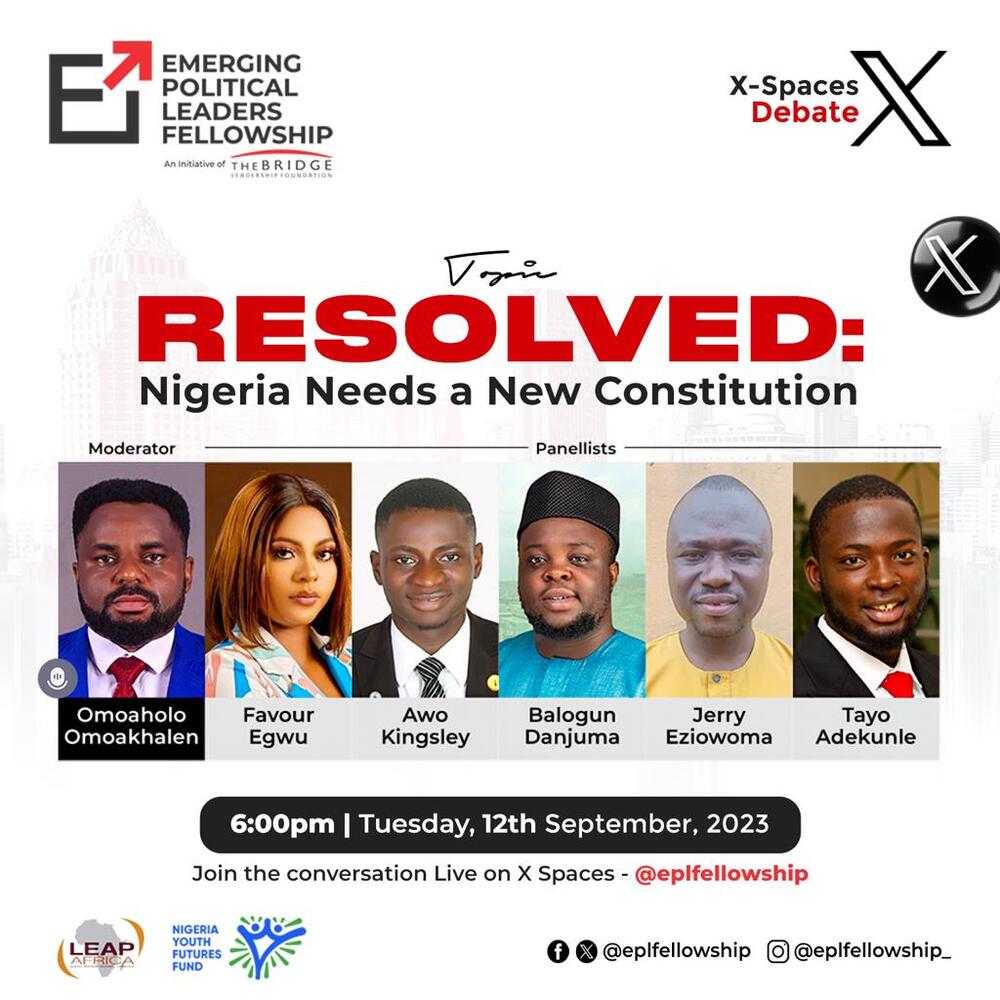On Tuesday, September 12, 2023, our esteemed Fellows hosted an X-Spaces Debate session titled “Resolved: Nigeria Needs a New Constitution.” The event brought together 39 participants and featured 5 distinguished Panellists: Favour Egwu, Awo Kingsley, Jerry Eziowoma, Tayo AdekunleBalogun Danjuma, and Omoaholo Omakhalen as the Moderator.
The primary objectives of this activity were:
– To explore the diverse viewpoints regarding the strengths and weaknesses of the current Nigerian constitution and seek a practical path to enhance its acceptability, citizen ownership, effective implementation, and promotion of good governance.
-To foster active engagement among participants in discussions related to Nigeria’s governance and constitution, cultivating a sense of civic responsibility.
-To promote a comprehensive understanding of the existing Nigerian constitution, including its merits and deficiencies.
-To facilitate a critical analysis of the rationale behind advocating for a new constitution, considering issues such as outdated provisions, ineffectiveness, and inclusivity challenges.
-To encourage participants to explore alternative methods for addressing constitutional issues, including amendments and reforms, while weighing their respective advantages and disadvantages.
-To emphasize the significance of inclusivity in the constitution-making process, involving diverse voices and perspectives from across the nation.
-To enhance participants’ knowledge of legal and political processes, helping them comprehend the complexities of constitutional changes.
The conversation commenced with the moderator, Omoaholo Omoakhalen, setting the stage by providing context on Nigeria’s constitutional journey. He outlined the three broad perspectives on the 1999 Constitution of the Federal Republic of Nigeria:
-Conservatives: Those who believe that the 1999 Constitution, as it stands, is adequate, and any issues stem from a lack of effective implementation.
-Evolutionists or Reformists: Individuals who acknowledge gaps in the framework but advocate for gradual improvements through reforms and alterations.
-Revolutionists: Those who assert that the 1999 constitution, imposed during the military era without citizen consultation, fails to represent the aspirations and diversity of Nigerians.
The panellists aligned themselves as follows: Jerry, Favour, and Balogun took the radical revolutionist stance, while Tayo Adekunle and Awo Kingsley identified as evolutionists or reformists.
The revolutionists argued that Nigeria’s current constitution, despite amendments, still reflects its military origins and fails to address democratic values and contemporary challenges. They advocated for a new constitution to address ethnic tensions, redefine power divisions, enhance local autonomy, and strengthen the electoral system.
In contrast, the evolutionists contended that reforms, rather than a complete overhaul, can achieve the desired improvements. They cited the U.S. Constitution’s 27 amendments as a model and emphasized that the 1999 constitution remains untested. Corruption, they argued, impedes its effective implementation.
While acknowledging the constraints under which the 1999 constitution was created, the revolutionists believed that the return to democracy provides an opportunity for a new constitution. Debates arose over the practicality of convening a constitutional conference and whether the National Assembly could adopt its recommendations.
Ultimately, the discussion converged on the possibility of a referendum as a viable path to a constitution that truly represents “We The People.” The importance of a constitution as the supreme framework governing a nation’s organization, political and economic powers, and social contract between citizens and the state was emphasized.
In summary, there was a consensus that Nigeria needs a more robust constitutional framework, with no conservative views among the panelists. The 1999 Constitution of the Federal Republic of Nigeria has evident gaps that require citizen ownership, clarity, independent institutions, and adherence to federalism principles.
Moving forward, emerging leaders will intensify their advocacy for a constitutional amendment to include provisions for referendums. Those aspiring for public office, including the young legislators empowered by the Not Too Young To Run Act of 2018, will champion the cause of a more acceptable constitutional experience by advocating for referendum amendments, thus allowing direct citizen participation in the constitutional process.

